人教版高中英语必修四第三单元学案自编
- 格式:doc
- 大小:67.50 KB
- 文档页数:5
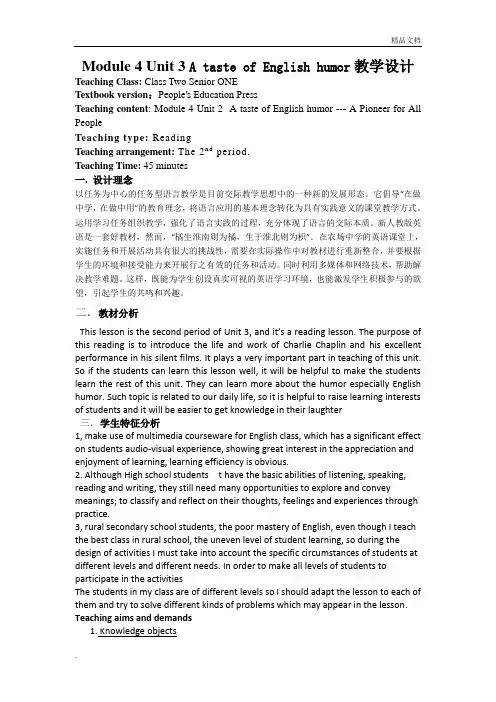
Module 4 Unit 3 A taste of English humor教学设计Teaching Class: Class Two Senior ONETextbook version:People's Education PressTeaching content: Module 4 Unit 2 A taste of English humor --- A Pioneer for All PeopleTeaching type: ReadingTeaching arrangement: The 2n d period.Teaching Time: 45 minutes一. 设计理念以任务为中心的任务型语言教学是目前交际教学思想中的一种新的发展形态。
它倡导“在做中学,在做中用”的教育理念,将语言应用的基本理念转化为具有实践意义的课堂教学方式。
运用学习任务组织教学,强化了语言实践的过程,充分体现了语言的交际本质。
新人教版英语是一套好教材,然而,“橘生淮南则为橘,生于淮北则为枳”。
在农场中学的英语课堂上,实施任务和开展活动具有很大的挑战性,需要在实际操作中对教材进行重新整合,并要根据学生的环境和接受能力来开展行之有效的任务和活动。
同时利用多媒体和网络技术,帮助解决教学难题。
这样,既能为学生创设真实可视的英语学习环境,也能激发学生积极参与的欲望,引起学生的共鸣和兴趣。
二.教材分析This lesson is the second period of Unit 3, a nd it’s a reading lesson. The purpose of this reading is to introduce the life and work of Charlie Chaplin and his excellent performance in his silent films. It plays a very important part in teaching of this unit. So if the students can learn this lesson well, it will be helpful to make the students learn the rest of this unit. They can learn more about the humor especially English humor. Such topic is related to our daily life, so it is helpful to raise learning interests of students and it will be easier to get knowledge in their laughter三.学生特征分析1, make use of multimedia courseware for English class, which has a significant effect on students audio-visual experience, showing great interest in the appreciation and enjoyment of learning, learning efficiency is obvious.2. Although High school students t have the basic abilities of listening, speaking, reading and writing, they still need many opportunities to explore and convey meanings; to classify and reflect on their thoughts, feelings and experiences through practice.3, rural secondary school students, the poor mastery of English, even though I teach the best class in rural school, the uneven level of student learning, so during the design of activities I must take into account the specific circumstances of students at different levels and different needs. In order to make all levels of students to participate in the activitiesThe students in my class are of different levels so I should adapt the lesson to each of them and try to solve different kinds of problems which may appear in the lesson. Teaching aims and demands1. Knowledge objectsMake the students be aware of the cultural aspects of humor by learning this lesson.2. Ability objects1. Develop students’ ability and let them learn different reading2. Enable students to talk about types of humors and Charlie Chaplin3. Moral objects①To enable the students to learn to be faced with difficulties and overcome them.②To encourage them to keep up optimistic attitude towards life and improve their sense of humor.Teaching key points1. Help the students grasp the reading skills.2. Help the students to learn to get information, analyze the information and understand the information from the text.Teaching difficulties1. How to fire the students’ enthusiasm to express their ideas.2. To make the students know the acting style of Charlie Chaplin and understand the connotation of humor.Teaching methods: Task-based teaching method, Skimming, Scanning and Group discussion.Teaching aids: A multi-media classroom.Teaching procedures & ways:Step 1 Lead-in (4 minutes)1.show a famous poem to students【设计说明】图片能吸引学生注意力,从而调动他们学习的积极性。
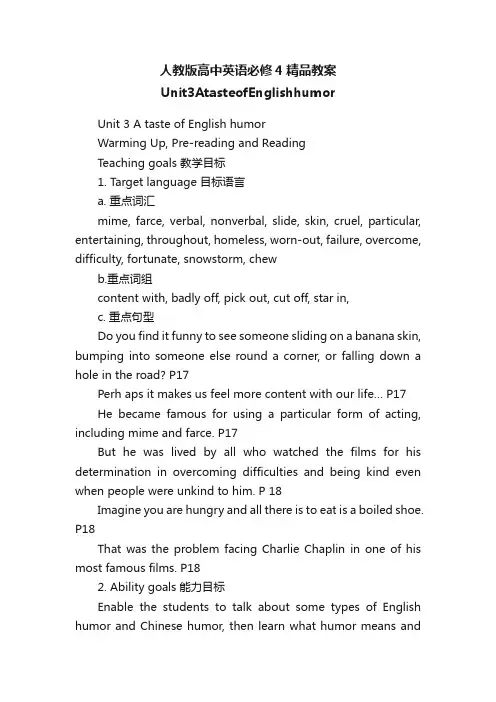
人教版高中英语必修4精品教案Unit3AtasteofEnglishhumorUnit 3 A taste of English humorWarming Up, Pre-reading and ReadingTeaching goals 教学目标1. Target language 目标语言a. 重点词汇mime, farce, verbal, nonverbal, slide, skin, cruel, particular, entertaining, throughout, homeless, worn-out, failure, overcome, difficulty, fortunate, snowstorm, chewb.重点词组content with, badly off, pick out, cut off, star in,c. 重点句型Do you find it funny to see someone sliding on a banana skin, bumping into someone else round a corner, or falling down a hole in the road? P17Perh aps it makes us feel more content with our life… P17He became famous for using a particular form of acting, including mime and farce. P17But he was lived by all who watched the films for his determination in overcoming difficulties and being kind even when people were unkind to him. P 18Imagine you are hungry and all there is to eat is a boiled shoe. P18That was the problem facing Charlie Chaplin in one of his most famous films. P182. Ability goals 能力目标Enable the students to talk about some types of English humor and Chinese humor, then learn what humor means andwhat is nonverbal humor3. learning ability goals 学能目标a. Help the students to learn how to talk about some types of English and Chinese humor, and then find their differences.b. Let the students listen and read the jokes, so that they can realize that humor is to let people to be optimistic about everything around.Teaching important points 教学重点Help the students learn how to understand and enjoy English humor. While as to the reading, learn how to divide the text into several parts according to the meaning of the passage Teaching difficulty points 教学难点a. Help the students know the differences between the English and Chinese humorsb. Decide the divide of the paragraphs of the textTeaching methods 教学方法Using pictures, discussion, reading, scanning and careful readingTeaching aids 教具准备A recorder and a projectorTeaching procedures & ways 教学过程与方式Step I RevisionAsk the students to read the words and expressions that appear in warming up, pre-reading and readingT: Class begin..Ss: Good morning, miss.T: Good morning, everyone. Before our class, please turn to P97 and read the new words together. Read twice for each one, ok?Ss: Ok. (The students read the new words together )Step II Warming upT: Good. Try your best to recite the words as soon as possible. Today, we are going to the new text. At first, I would like to show you a picture. Please look at the picture carefully. (Start the newunit by showing the students a picture)T: Look! What do you think of the picture?Ss: It’s very interesting. A wolf or maybe it is a dog is jumping across the back of a sheep.T: Yes. Actually, it is a wolf. As we know, wolf is the natural enemy of sheep. Will a wolf jump across a sheep without eating it? No. After seeing the picture, it is so funny that we can’t help laughing about their acting. It makes us laugh and feel nice. Sotoday, we are going to learn something about humor. The title is A taste of English humor. Do you know some English humor? Ss: (Some students may know some English humor and they will put up their hands.)T: Ok, I’ll ask someone to tell some English humors to us.(Ask some students to tell.)T: That’s real ly funny. Thank you! In fact, we name the English humor you told just now verbal joke. Then, look at some pictures again. Guess who they are.Ss: The first one is Charlie Chaplin.T: Yes, I dare say that everybody know him. How about the second picture?Ss: He is Mr. Bean, one of the most famous and successful British actor.T: Good. You are right. He is now recognized as the most popular British comedy expert. How about the last one? We have just learnt one of his play—A million pound bank-note. Now, do you know who he is?Ss: Mark Twain.T: Yes. He is an American writer and his writing is famous for humor, right?Ss: Yes.T: Now, let’s look at the chart on P17. What does it tell us from the table?We can see that Charlie Chaplin is good at nonverbal humor; Mr. bean is famous for his mime and farce; while Mark Twain was good at tell some funny tales. Then how about Edward Lear? Do youknow him?Ss: No, we don’t know.T: Ok, he is a famous British poet. His poems are funny and they were all from daily life. Until now people also read them and enjoy them. If you want to know more about him, you can go and read about him in:/zm/20030313/cs/zt/20030 3130846.aspor you can read the book 《爱德华·李尔:一个漫游者的一生》which was written by Vivian Noakes.However, we will meet the problem that it seems some English humors sound no funny at all to usbecause the sense of humor of English and Chinese is different. So, do you know some persons in Chinese who are good at humor? I’ll show you some pictures again. See, who are they and what are they good at? Nonverbal, mime and farce, funny tales or funny poems?Ss: The first picture is Chen Peisi. The second one is Zhao Benshan, bu t I don’t know the third and the fourth one.T: Do you know what are Chen Peisi and Zhao Benshan good at?Ss: Chen Peisi is famous for his mime and farce. ZhaoBenshan is famous for his Xiaopin.T: Good. I think Zhao Benshan is famous for his mime, too. The third one is Hou Baolin, who is a famous cross talk actor. But what a pity, he has died. The last one is Liu Quanhe & Liu Quanli, both of them are good at Ya ju (哑剧). So, can you finish the column of the chart now?The suggested answers:Step III Pre-readingT: According to the column, what do you like to laugh at?Ss: (Ask the students to talk about their opinion)T: Ok, as you all have your own choice and you do love making jokes, right? However, do you know what humor means exactly? Does it mean all the things that make people laugh?Ss: We think so.T: Have you ever thought that there may be some jokes which will hurt the other person? For example: ―You, stupid pig! If you keep on making mistakes, I will pick your head and beat it like a basketball.‖ Do y ou think I am right to say these words?Ss: No, it is rude.T: That means humor is not always kind. Pay attention to your words when you want to make jokes. Then, what we are going to learn is a kind of humor that makes people laugh without using any words. How can we? Please look at the P17------ reading:Nonverbal humorStep IV ReadingT: This reading material takes Charlie Chaplin for example. It tells us what nonverbal humor means; what’s Charlie Chaplin’s style of acting; how he made a sad situation entertaining and so on.At first, as I have told you to preview the text, tell me how many passages the material can be divided and the main idea of each paragraph.Ss: We think the text is made up of four parts. The first part is the first paragraph. The second part is the second paragraph. The third and the fourth part is the third paragraph. And the last paragraph is the fourth part. The first part tells us that not all humor is kind. The second part tells us that some actors can astonish us with the deep feeling they can inspire with us for a character they are playing. The th ird one tells us something about Charlie Chaplin’s acting style. The last one is a short biography about Charlie Chaplin.T: Ok, it sounds reasonable. Are there any different opinions?Ss: We think there are three parts in this text. The first paragraph is the first part. From the second to the fourth paragraph is the second part. And the last one is the last part.T: Can you tell us your main ideas of the text?Ss: The first and the last ones are the same with my classmate before, but I think the second part of the text is about Charlie Chaplin’s humor.T: Good. Both of you sound reasonable. A reading material can have many different understanding! Here is my idea, you can think over whether it is reasonable or not. The text can also be divided into three parts. The first and the second paragraph arethe first part. It tells us that there are two kinds of humor. One is bad and the other can inspire people. The second part is the third and the fourth paragraphs. It tells us how Charlie Chaplin made a sad situation entertaining. And the last part is the same with yours. Ok, think over my idea after class.Then, let us have a discussion about the text. Please look at the screen. These are three questions. Read the text again and find the answer to the questions.1.What is behind fun?______________________________________________________________2.Why did people like The Little Tramp?________________________________________________________________3.Do you think Charlie Chaplin’s eating boiled shoes funny? Why?________________________________________________________________ _Three minutes later:T: Who would like to answer the first question?Ss: From the first paragraph, we can see that not all humor is kind. Although we also laugh when we see someone slide on a bana na, it’s really dangerous to those one, especially to those old people. So when we think about it we will find it is not funny.T: Yes. That means when we are trying to play a joke, we have to think whether it will bring hurt to the others, right? Fun is to bring happiness but not sadness. How about the second question? Ss: Because it gives people courage to overcome difficulties. / I think that people liked him best is because he was always being kind even when people were unkind to him.T: Good. Any other opinions?Ss: I think that people like him is because he will never teasehim.T: Ok, and how about the last question?Ss: I think it is funny, but not very much, because I’m not hungry. / I don’t think it is funny because it reminds me of the people who are in true hunger.T: Maybe. Anyway, I think the happiest feeling needn’t other people to find and to wake. Everyone can do this. We all have our own life, no matter we are poor or rich, and we should live happily.Well, so much on today. Do you have any questions about what we have learned? (Wait for the students’ response.) If there is no questions, then remember yourStepV Homework:Read the text again and find the language points1.Finish the Comprehending and Learning about Language on P19(If there are few minutes left, ask the students to read the text by themselves.)Unit 3 A taste of English humorVocabulary and Useful Expressions一、日常口语突破情感(1)— What do you think of the lecture? 你认为那讲座如何呀?— How wonderful. 好极了。
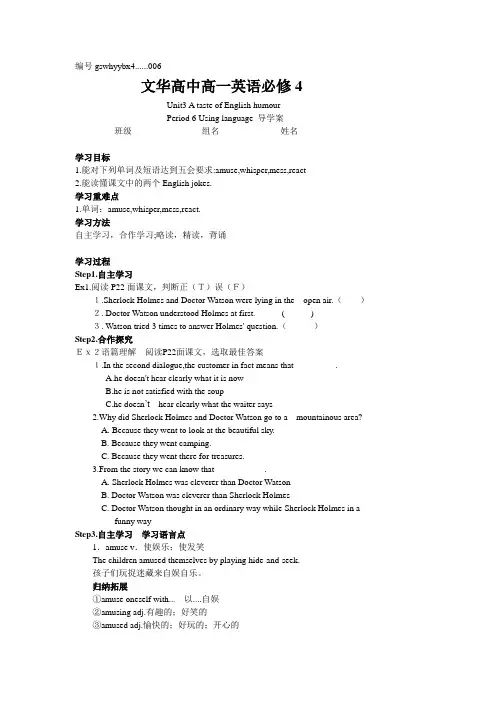
编号gswhyybx4 (006)文华高中高一英语必修4Unit3 A taste of English humourPeriod 6 Using language 导学案班级___________ 组名____________ 姓名___________学习目标1.能对下列单词及短语达到五会要求:amuse,whisper,mess,react2.能读懂课文中的两个English jokes.学习重难点1.单词:amuse,whisper,mess,react.学习方法自主学习,合作学习;略读,精读,背诵学习过程Step1.自主学习Ex1.阅读P22面课文,判断正(T)误(F)1.Sherlock Holmes and Doctor Watson were lying in the open air.()2. Doctor Watson understood Holmes at first. ( )3. Watson tried 3 times to answer Holmes' question.()Step2.合作探究Ex2语篇理解阅读P22面课文,选取最佳答案1.In the second dialogue,the customer in fact means that _________.A.he doesn't hear clearly what it is nowB.he is not satisfied with the soupC.he doesn’t hear clearly what the waiter says2.Why did Sherlock Holmes and Doctor Watson go to a mountainous area?A. Because they went to look at the beautiful sky.B. Because they went camping.C. Because they went there for treasures.3.From the story we can know that ___________.A. Sherlock Holmes was cleverer than Doctor WatsonB. Doctor Watson was cleverer than Sherlock HolmesC. Doctor Watson thought in an ordinary way while Sherlock Holmes in afunny wayStep3.自主学习学习语言点1.amuse v.使娱乐;使发笑The children amused themselves by playing hide-and-seek.孩子们玩捉迷藏来自娱自乐。
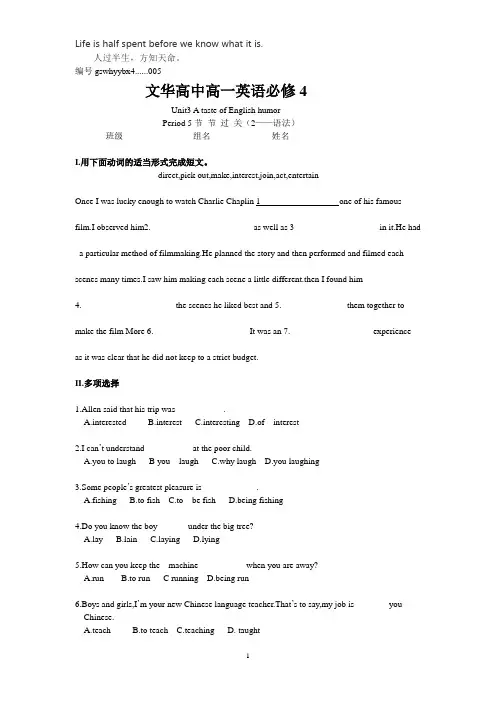
编号gswhyybx4 (005)文华高中高一英语必修4Unit3 A taste of English humorPeriod 5节节过关(2——语法)班级___________ 组名____________ 姓名___________I.用下面动词的适当形式完成短文。
direct,pick out,make,interest,join,act,entertainOnce I was lucky enough to watch Charlie Chaplin 1__________________one of his famous film.I observed him2._______________________ as well as 3___________________ in it.He had a particular method of filmmaking.He planned the story and then performed and filmed each scenes many times.I saw him making each scene a little different.then I found him4._____________________ the scenes he liked best and5._______________them together to make the film More6.______________________It was an7.___________________experience as it was clear that he did not keep to a strict budget.II.多项选择1.Allen said that his trip was___________.A.interestedB.interestC.interestingD.of interest2.I can’t understand __________ at the poor child.A.you to laugh B you laugh C.why laugh D.you laughing3.Some people’s greatest pleasure is ____________.A.fishingB.to fishC.to be fishD.being fishing4.Do you know the boy ______ under the big tree?yinyingD.lying5.How can you keep the machine __________ when you are away?A.runB.to run C running D.being run6.Boys and girls,I’m your new Chinese language teacher.That’s to say,my job is _______ you Chinese.A.teachB.to teachC.teachingD. taught7.--What’s in the bottle?--Water.Oh,yes ,_______ water.If you’re thirsty,you may dink some.A.drinkB.drinkingC.to drinkD.drunk8.They use computers to keep the traffic ___________smoothly.A.being runningB.runC.to runD.runningIII.用所给动词的适当形式填空.1.The passengers are waiting in the ________(wait) room.2.The patient on the _________________(operate) table is his grandfather.3.The _____________(rise) sun looks very beautiful in the early morning.4.With so many people________________(help) us,I’m sure we will finish the project in time.5.A little child ____________(learn) to walk often falls(摔倒).6.Who is the man ______________(stand) by the door?7.When the mum went into the room,she found her little son __________(lie) on the floor.8.I’m sorry to keep you _____________(wait) so long.9.It was so cold that they had the fire _____________(burn) all night long.ura was away in Paris for over a week.When she got home,there was a pile of mail________ (wait) for her.11.The room is empty except for a bookshelf ______________(stand) in the corner.12.The girls were noticed __________________(quarrel)with each other at this time yesterday.13.The most important thing is ___________(get) there in time.14.You can see them __________________(perform) every night this week at the new theatre.15.The person ___________________(translate) the songs can speak seven languages.16.Hi,Tom.Listen to the birds _____________(sing).编号gswhyybx4 (005)文华高中高一英语必修4Unit3 A taste of English humorPeriod 5节节过关(2——语法)编制人周德慧审核人高一英语组编制时间2014年4月21日I.用下面动词的适当形式完成短文。
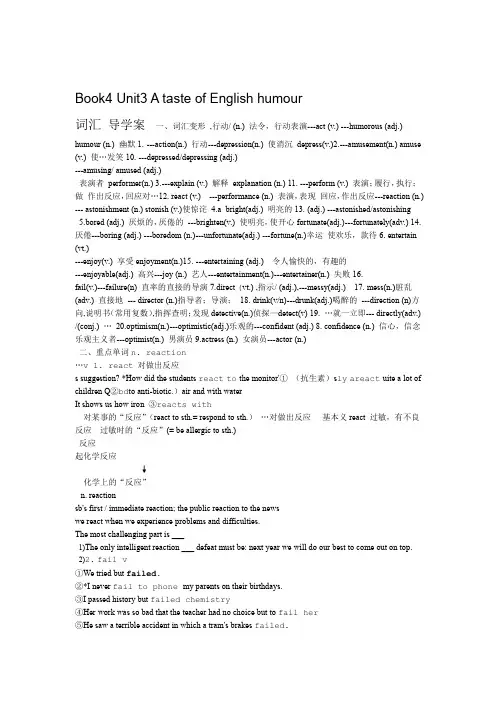
Book4 Unit3 A taste of English humour词汇导学案一、词汇变形,行动/ (n.) 法令,行动表演---act (v.) ---humorous (adj.)humour (n.) 幽默1.---action(n.) 行动---depression(n.) 使消沉depress(v.)2.---amusement(n.) amuse (v.) 使…发笑10.---depressed/depressing (adj.)---amusing/ amused (adj.)表演者performer(n.) 3.---explain (v.) 解释explanation (n.) 11.---perform (v.) 表演;履行,执行;做作出反应,回应对…12.react (v.) ---performance (n.) 表演,表现回应,作出反应---reaction (n.) --- astonishment (n.) stonish (v.)使惊诧4.a bright(adj.) 明亮的13.(adj.) ---astonished/astonishing 5.bored (adj.) 厌烦的,厌倦的---brighten(v.) 使明亮,使开心fortunate(adj.)---fortunately(adv.) 14.厌倦---boring (adj.) ---boredom (n.)---unfortunate(adj.) ---fortune(n.)幸运使欢乐,款待6. entertain (vt.)---enjoy(v.) 享受enjoyment(n.)15.---entertaining (adj.) 令人愉快的,有趣的---enjoyable(adj.) 高兴---joy (n.) 艺人---entertainment(n.)---entertainer(n.)失败16.fail(v.)---failure(n)直率的直接的导演7.direct (vt.) ,指示/ (adj.),---messy(adj.) 17.mess(n.)脏乱(adv.) 直接地--- director (n.)指导者;导演;18.drink(v/n)---drunk(adj.)喝醉的---direction (n)方向,说明书(常用复数),指挥查明;发现detective(n.)侦探—detect(v)19. …就一立即--- directly(adv.) /(conj.) …20.optimism(n.)---optimistic(adj.)乐观的---confident (adj.) 8. confidence (n.) 信心,信念乐观主义者---optimist(n.)男演员9.actress (n.) 女演员---actor (n.)二、重点单词n. reaction…v 1. react 对做出反应s suggestion? *How did the students react to the monitor'①(抗生素)s ly areact uite a lot of children Q②bd to anti-biotic.)air and with waterIt shows us how iron ③reacts with对某事的“反应”(react to sth.= respond to sth.)…对做出反应基本义react 过敏,有不良反应过敏时的“反应”(= be allergic to sth.)反应起化学反应化学上的“反应”n. reactionsb's first / immediate reaction; the public reaction to the newswe react when we experience problems and difficulties.The most challenging part is ___1)The only intelligent reaction ___ defeat must be: next year we will do our best to come out on top.2)2.fail v①We tried but failed.②*I never fail to phone my parents on their birthdays.③I passed history but failed chemistry④Her work was so bad that the teacher had no choice but to fail her⑤He saw a terrible accident in which a tram's brakes failed.⑥His eyesight is failing.when I wanted to express my thanks to him.failed me *Words ⑦.nfailurefind a job.failure to ①She is depressed by her continued; it was a great success. far from being a failure*The art show was ②the power failure/ engine failure/ heart failure③考试失败??fail机器等运转失灵??) 基本义(身体各项功能等失败?失败,??未能做未能达到期望??failfailurev n失败,未能做抽象名词具体化v出故障,失灵 nAll his efforts ended in failure.1)In fact, he thought of himself as ___ failure. 2)_(fail) to observe all Park rules could result in being driven out of the Park. 3)(fail) health.4)She has suffered from ___English. ________(pass) the English test last term because I was not good at 5)I failed __adj. 满足的,满意的vt. 使满足n.(书)目录;内容,容量3.content满足be/feel content with sth = be/feel satisfied/pleased with 对满意/ ……乐意做某事be content to do sth = be willing to do sth=be pleased to do sth )…(动词只记这一个句型content oneself with 满足于you will have greater success. If you are not content ____ the progress you've made, 1)( live) in the country. That rich man is tired of city life, so he is content 2)n.contentcontents She dropped her handbag and the 容器等fell out on the floor. contentLook at the contents page of the book书刊词源义before buying it. 包含的东西The content of your speech is excellent. 书籍,文章,演讲)food with a high fat content 物质(食物用于名词后1)As I emptied out the old wallet, I was amazed at how much it held. Carefully I went throughits_ _ piece by piece and moved them to their new home.contents pockets D.CA. papers B.belongings .2)Oranges have a high vitamin C content.3)The teacher returned his paper and said the content was very interesting.vt. 使惊讶,使震惊4.astonish(1)astonish sb. with/by sth. 用某事使某人惊讶(2)astonished adj.感到惊讶的astonishing adj. 令人吃惊的be astonished at sth. / to do sth. / that 从句对做……感到惊讶(3)astonishment n. 惊讶(much)to one's astonishment 使某人惊讶的是everybody present. What he said at the meeting 1)party. We were ____ _ (astonish) that he appeared at the 2)_ (astonish) that none of you like the play. I find ____ _ quite __ 3)_, he has won the game. everyone's ___ 4)To(find) the temple still in its original condition. 5)We were astonished ____1)What she said _______ (convince) me that I was mistaken.2)* I soon convinced him __ ____ my innocence.3)There is now ___ _________ evidence that smoking causes lung cancer. (convince)6.direct vt. 导演指示,指挥adj. 直接的;直率的adv. 直接地(1)direct sb. to do sth. 指示(令)某人做某事direct sb. to sp 指给某人去某地的路(2)director n. 指导者;导演;direction n. 方向;指挥;说明书(常用复数)directly adv. 直接地,立即conj. 一…就…(连词,引导时间状语从句)(3)in the direction of 向……方向in all directions = in every direction 朝四面八方under the direction of 在……指导下the teacher came in, everyone was quiet. 1)*(answer) the question. 2)He directed the studentsthe airport. 3)The driver directed us(direct) the traffic. There was a police officer ___ 4)the direction of the police station.*He is walking 5)on the medicine bottle. )(direction6)Follow the;低声说私语;vi.& vt 耳语7.whisper n .耳语;…………;传闻It is / was whispered that 有人私下说thatwhisper to sb ()向某人低声说in whispers = in a whisper = in a low voice 低声地her so that no one else would hear him. He whispered __ _____ 1)(whisper) that the firm is likely to go bankrupt.__It _2)8.entertain vt.& vi. 使…欢乐;款待entertainer n. 表演者,艺人entertain sb. with sth./by doing sth. 用某物/通过做某事使某人快乐entertain sb. to sth. 用……招待/款待某人(=treat sb. to sth.)He entertained us __ _____ his stories and jokes. 1)He fell in the water, much to the __ (entertain) of the children.2)三、重点短语1.badly off 贫穷的,缺少的一般当作形容词使用,作表语。
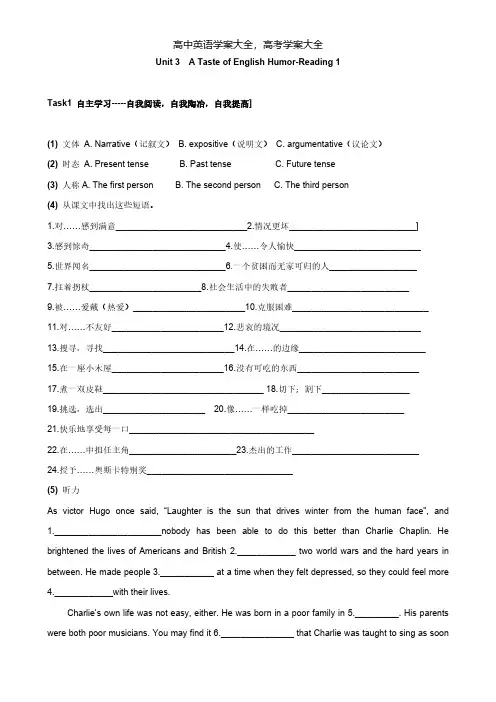
Unit 3 A Taste of English Humor-Reading 1Task1 自主学习-----自我阅读,自我陶冶,自我提高](1) 文体A. Narrative(记叙文)B. expositive(说明文)C. argumentative(议论文)(2) 时态A. Present tense B. Past tense C. Future tense(3) 人称A. The first person B. The second person C. The third person(4)从课文中找出这些短语。
1.对……感到满意___________________________2.情况更坏__________________________]3.感到惊奇____________________________4.使……令人愉快__________________________5.世界闻名____________________________6.一个贫困而无家可归的人__________________7.拄着拐杖_______________________8.社会生活中的失败者_________________________9.被……爱戴(热爱)_______________________10.克服困难____________________________11.对……不友好_______________________12.悲哀的境况_____________________________13.搜寻,寻找___________________________14.在……的边缘__________________________15.在一座小木屋_______________________16.没有可吃的东西_________________________17.煮一双皮鞋_________________________________ 18.切下;割下__________________19.挑选,选出_____________________ 20.像……一样吃掉________________________21.快乐地享受每一口______________________________________22.在……中担任主角______________________23.杰出的工作__________________________24.授予……奥斯卡特别奖______________________________(5) 听力As victor Hugo once said, “Laughter is the sun that drives winter from the human face”, and 1.______________________nobody has been able to do this better than Charlie Chaplin. He brightened the lives of Americans and British 2.____________ two world wars and the hard years in between. He made people 3.___________ at a time when they felt depressed, so they could feel more 4.____________with their lives.Charlie’s own life was not easy, either. He was born in a poor family in 5._________. His parents were both poor musicians. You may find it 6._______________ that Charlie was taught to sing as soonas he could speak and dance as soon as he could walk. 7.______________________was common in acting families at this time, especially when the family income was often uncertain.8.________________, his father died, leaving the family even 9._____________________, so Charlie spent his childhood looking after his sick mother and brother. By his teens, Charlie had, through his10._____________, become one of the most popular child actors in England. He could mime and act the fool doing 11._____________everyday tasks. No one was ever bored watching him – his subtle acting made everything 12.___________________.(6)语法填空As time went by, Charlie began 1.___________ (make) films. He grew more and more popular as his charming character, the little tramp, became known throughout the world. The tramp, 2._____ poor and homeless man with a moustache, wore large trousers, worn-out shoes and a small round black hat. He walked around stiffly carrying a walking stick. This character was a social failure but 3.____________________(love) for his optimism and4._________________(determine) to overcome all difficulties. He was the underdog 5.__________was kind even when others were unkind 6.____him.There is an example of the little tramp from his films The Gold Rush. The little tramp and his friend went to California in search 7.____ gold, but without success. They were very hungry and had 8.____________ to eat. They were so hungry 9._________ they try boiling a pair of leather shoes for their dinner. And he ate the shoes with great 10.________________(enjoy). His acting is so 11._________________(convince) that it makes you believe it is the most delicious meal he has ever tasted.Task 2 课文理解1. The role Charlie Chaplin played in films ______.A. was poor and homelessB. wore large trousers, worn-out shoes and a small round black hatC. always carried a walking stickD. all the above2. Charlie Chaplin made eating a boiled shoe funny by______.A. using funny linesB. using nonverbal humourC. using amusing expressionsD. using gestures3. Which of the following information about Charlie Chaplin is NOT mentioned in the text?A. Chaplin wrote some movies for some other famous stars in his days.B. Chaplin produced and directed some films he starred in.]C. Chaplin was born in 1889 and passed away in 1977.D. Chaplin was given a special Oscar for his lifetime outstanding work in 1972. Paragraph 1Why people needed cheering upHe _______________the lives of Americans and British, and madepeople laugh when they feel _______________, so they could feel more___________ with their lives.Paragraph 2What Charlie Chaplin’s childhood was like.He was born in a poor family in _____________. His parents were_____________________.As a child, he was taught to __________ and ____________. ]His father died, he had to ____________________his mother and brother.Later, he was famous. He could _________ and______________________doing ordinary things.Paragraph 3What his most famous character was like.A poor homeless man with a _________________Wore ____________________, worn- out shoes, ___________________anda walking stick.Paragraph 4 .Com]An example of a sad situation that he made funny.In the film of ____________________, he acted as if_____________________ he ate when he was hungry were the finest meal. Paragraph 5His achievements.In 1972 he was given a special ______________for his outstanding work in films.He spent his last years in _____________________ and died in ______.。
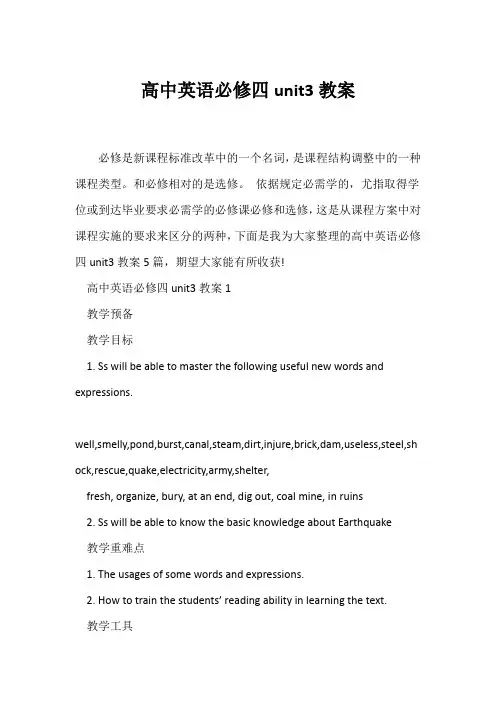
高中英语必修四unit3教案必修是新课程标准改革中的一个名词,是课程结构调整中的一种课程类型。
和必修相对的是选修。
依据规定必需学的,尤指取得学位或到达毕业要求必需学的必修课必修和选修,这是从课程方案中对课程实施的要求来区分的两种,下面是我为大家整理的高中英语必修四unit3教案5篇,期望大家能有所收获!高中英语必修四unit3教案1教学预备教学目标1. Ss will be able to master the following useful new words and expressions.well,smelly,pond,burst,canal,steam,dirt,injure,brick,dam,useless,steel,sh ock,rescue,quake,electricity,army,shelter,fresh, organize, bury, at an end, dig out, coal mine, in ruins2. Ss will be able to know the basic knowledge about Earthquake教学重难点1. The usages of some words and expressions.2. How to train the students’ reading ability in learning the text.教学工具课件教学过程Step I lead-inLet students see a short video and answer the questions1.What happened in the video Earthquakes2.How do you feel seeing the plots(情节) Students’ discussion. Step II Fast reading1. What is the passage mainly about In Tangshan ,earthquakes happened on July 28th 19762. Skim the text and answer the questionsThe type of writing (写作体裁)Narrative writingTopic sentence of Paragraph 1Sentence 1Topic sentence of Paragraph 2Sentence 2Topic sentence of Paragraph 3Sentence 1Topic sentence of Paragraph 4Sentence 1Step III Detailed readingAsk students to read the text carefully and answer the questionsTask1: What were the nature signs of the coming earthquake(选择)Para 11.Water in well( G )2. Well walls(D )3.Chickens pigs(F ) 4 .Mice (A)5.Fish(E )6. Bright lights( B)7. Water pipes(C )A. Ran out of fieldsB. in the skyC. Cracked and burstD. Deep cracksE. Jumped out of pondsF. Too nervous to eatG. Rose and fell, fell and roseTask 2 Fill in the blanksMain IdeaDetailsDamage caused byearthquakePara 2-3At _____ am, the __________ earthquake of the 20th century began . _______ burst from holes in the ground.Hard hills of the rock became rivers of ____.________ covered the ground like red autumn leaves.Two _______ and most of the bridges fell.The railway tracks were now _________pieces of _______.______ now filled the wells instead of water.Water,food,and ______________ were hard to get.The reconstruction(重建) after the earthquakePara 41. The army _____________2. Workers ____________for survivors.3._____________was taken to the city.Details:1. At 3:42 am, the greatest earthquake of the 20th century began.2. Steam burst from holes in the ground.3. Hard hills of the rock became rivers of dirt.4. Bricks covered the ground like red autumn leaves.5. Two dams and most of the bridges fell.6. The railway tracks were now useless pieces of steel.7. Sand now filled the wells instead of water.8. Water, food, and electricity were hard to get.Step IV consolidation (当堂稳固)Let students fill the blanks according to the passageStrange things were happening in the countryside of northeast Hebei. For three days the water in the village wells kept rising and1_________(fall). Farmers noticed that the well walls had deep cracks 2___________ them. A smelly gas came out of the cracks. In3_________farmyards, the chickens and even the pigs were too nervous 4__________(eat). 5_________(mouse) ran out of the fields looking for places 6________(hide). Fish jumped outOf their bowls and ponds. At about 3 am on July 28,1976, some people saw bright lights 7_________ the sky. The sound of planes could 8________(hear) outside the city of Tangshan even 9_________ no planes were in the sky.In the city, the water pipes in some buildings cracked and burst. But the one million people of the city, ________thought little of these events, were asleep as usual that night.1 falling2 in3 the4 to eat5 mice6 to hide 7in 8 be heard 9when 10 who这局部目的是让同学进一步稳固课文的内容。
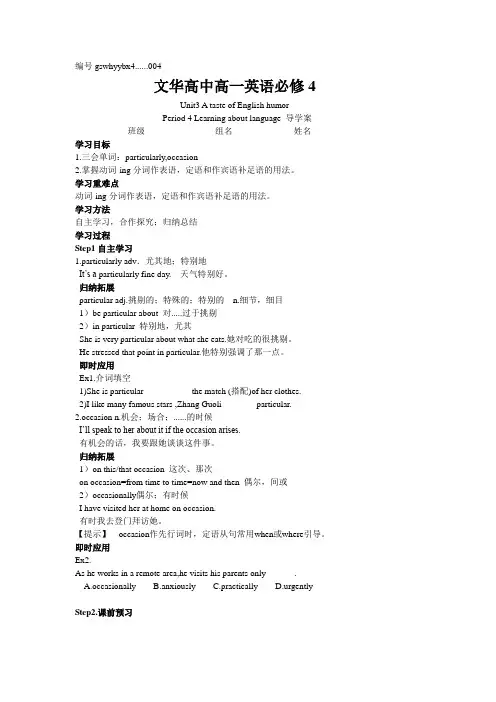
编号gswhyybx4 (004)文华高中高一英语必修4Unit3 A taste of English humorPeriod 4 Learning about language 导学案班级___________ 组名____________ 姓名___________ 学习目标1.三会单词:particularly,occasion2.掌握动词-ing分词作表语,定语和作宾语补足语的用法。
学习重难点动词-ing分词作表语,定语和作宾语补足语的用法。
学习方法自主学习,合作探究;归纳总结学习过程Step1自主学习1.particularly adv.尤其地;特别地It’s a particularly fine day. 天气特别好。
归纳拓展particular adj.挑剔的;特殊的;特别的n.细节,细目1)be particular about 对.....过于挑剔2)in particular 特别地,尤其She is very particular about what she eats.她对吃的很挑剔。
He stressed that point in particular.他特别强调了那一点。
即时应用Ex1.介词填空1)She is particular __________ the match (搭配)of her clothes.2)I like many famous stars ,Zhang Guoli _______ particular.2.occasion n.机会;场合;......的时候I’ll speak to her about it if the occasion arises.有机会的话,我要跟她谈谈这件事。
归纳拓展1)on this/that occasion 这次、那次on occasion=from time to time=now and then 偶尔,间或2)occasionally偶尔;有时候I have visited her at home on occasion.有时我去登门拜访她。
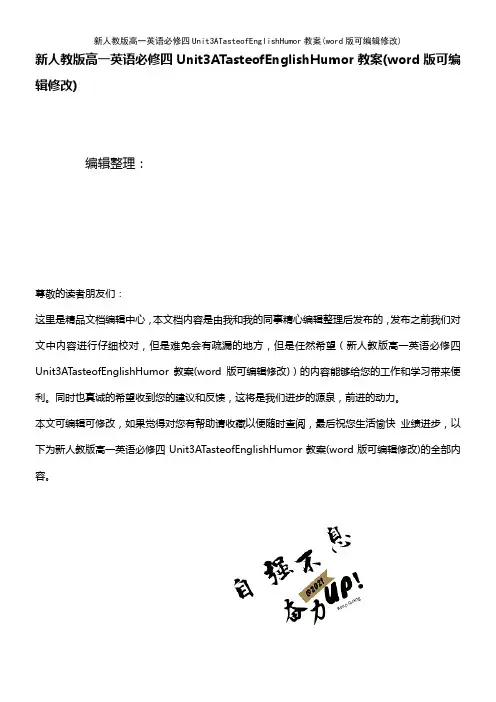
新人教版高一英语必修四Unit3ATasteofEnglishHumor教案(word版可编辑修改)编辑整理:尊敬的读者朋友们:这里是精品文档编辑中心,本文档内容是由我和我的同事精心编辑整理后发布的,发布之前我们对文中内容进行仔细校对,但是难免会有疏漏的地方,但是任然希望(新人教版高一英语必修四Unit3ATasteofEnglishHumor教案(word版可编辑修改))的内容能够给您的工作和学习带来便利。
同时也真诚的希望收到您的建议和反馈,这将是我们进步的源泉,前进的动力。
本文可编辑可修改,如果觉得对您有帮助请收藏以便随时查阅,最后祝您生活愉快业绩进步,以下为新人教版高一英语必修四Unit3ATasteofEnglishHumor教案(word版可编辑修改)的全部内容。
新人教版高一英语必修四Unit 3 A Taste ofEnglish Humor教案Unit 3 A Taste of English Humor单元教学目标Talk about different types of humor;a taste of English humorLearn how to express one’s emotionsLearn the –ing form as the Predicative, Attributive and Object ComplementLearn to write humorous stories目标语言话题Different types of humor; a taste of English humor词汇1. 四会词汇:slide, skin, cruel, content, astonish, particular,entertain, entertaining, throughout,homeless, worn—out, failure, overcome, difficulty, boil,fortunate, snowstorm, chew, bottom, mouthful, direct, star, outstanding, Switzerland, fortune, swing,pancake, mountainous, whisper, vast, sense2. 词组:be content with, badly off, pick out, cut off, star in, knock into功能情感( Emotion )I enjoy thi s very much because… It surprises me that…I laugh at that kind of thing because… I felt happy because…This is fun because… I’m pleased we were both amused at…How wonderful / surprising! It’s amusing that…语法动词的-ing 形式作表语,定语和宾语补足语的用法T heir job is “panning for gold”。
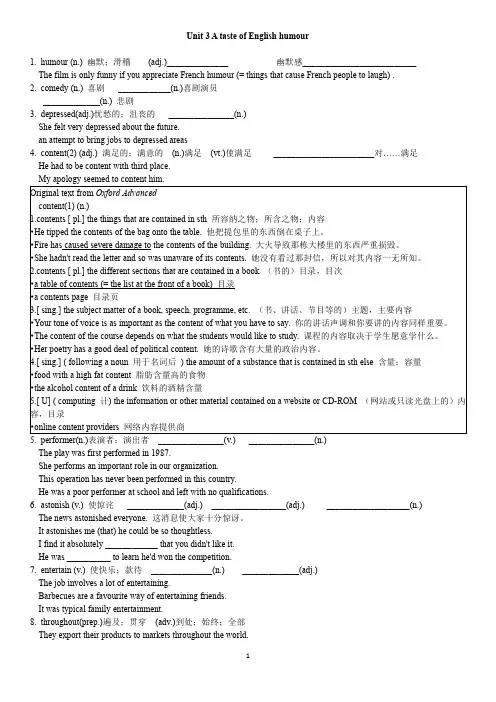
Unit3A taste of English humour1.humour(n.)幽默;滑稽(adj.)______________幽默感__________________________ The film is only funny if you appreciate French humour(=things that cause French people to laugh).edy(n.)喜剧____________(n.)喜剧演员_____________(n.)悲剧3.depressed(adj.)忧愁的;沮丧的_______________(n.)She felt very depressed about the future.an attempt to bring jobs to depressed areas4.content(2)(adj.)满足的;满意的(n.)满足(vt.)使满足_______________________对……满足He had to be content with third place.The play was first performed in1987.She performs an important role in our organization.This operation has never been performed in this country.He was a poor performer at school and left with no qualifications.6.astonish(v.)使惊诧_____________(adj.)_________________(adj.)___________________(n.) The news astonished everyone.这消息使大家十分惊讶。
It astonishes me(that)he could be so thoughtless.I find it absolutely____________that you didn't like it.He was__________to learn he'd won the competition.7.entertain(v.)使快乐;款待______________(n.)_____________(adj.)The job involves a lot of entertaining.Barbecues are a favourite way of entertaining friends.It was typical family entertainment.8.throughout(prep.)遍及;贯穿(adv.)到处;始终;全部They export their products to markets throughout the world.The museum is open daily throughout the year.This custom is found in people of all races throughout the world.9.failure(n.)失败(者)____________(v.)_________(n.)成功____________(v.)_______________(adj.)成功的I tried to discuss it with her but only succeeded in making her angry(=I failed and did the opposite of what I intended).I failed in my attempt to persuade her.He failed to keep the appointment.10.optimism(n.)乐观;乐观主义___________(adj.)乐观的________(n.)悲观;悲观主义___________(adj.)悲观的11.overcome(v.)战胜;克服___________________________战胜困难12.mouthful(n.)_________A Bite of China_________________13.convince(v.)使信服________________(adj.)______________(v.)(同义词)You'll need to convince them of your enthusiasm for the job.I've been trying to convince him to see a doctor.a convincing argument/explanation/casea convincing victory/win14.direct(v.)/(adj.)____________(反义词)_______________(n.)_______________(n.) the most direct route/courseHis death was a direct result of your action.She glanced in his direction.the managing director总经理the musical director音乐总监a regional director地区主管15.confidence(n.)信心;信念______________(adj.)The players all have confidence in their manager.She has every confidence in her students'abilities.People often lose confidence when they are criticized.While girls lack confidence,boys often overestimate their abilities.The team feels confident of winning.The teacher wants the children to feel confident about asking questions when they don't understand.16.particular(adj.)特殊的;特别的(n.)细节;细目___________(adv.)We must pay particular attention to this point.=These documents are of particular interest.=particularly good/important/useful特别好╱重要╱有用17.occasion(n.)时刻;场合occasional(adj.)偶尔的;偶然的on occasion偶尔;偶然I can remember very few occasions when he had to cancel because of ill health.On one occasion,she called me in the middle of the night.I'll speak to him about it if the occasion arises(=if I get a chance).He works for us on an occasional basis.他在我们这里做临时工。
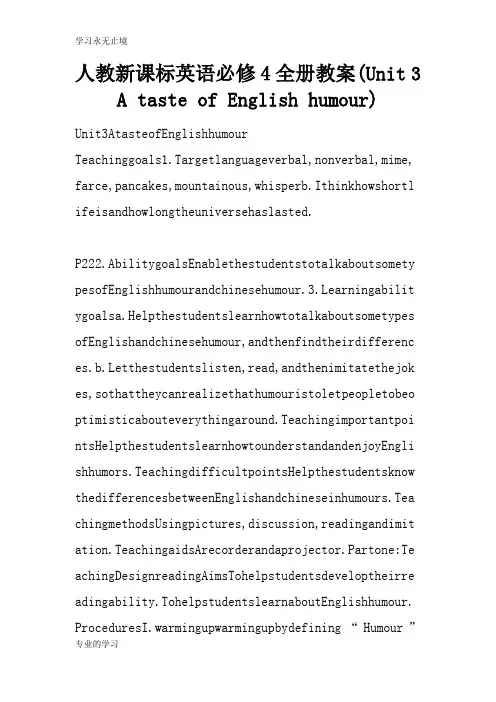
人教新课标英语必修4全册教案(Unit 3A taste of English humour)Unit3AtasteofEnglishhumourTeachinggoals1.Targetlanguageverbal,nonverbal,mime, farce,pancakes,mountainous,whisperb.Ithinkhowshortl ifeisandhowlongtheuniversehaslasted.P222.AbilitygoalsEnablethestudentstotalkaboutsomety pesofEnglishhumourandchinesehumour.3.Learningabilit ygoalsa.Helpthestudentslearnhowtotalkaboutsometypes ofEnglishandchinesehumour,andthenfindtheirdifferenc es.b.Letthestudentslisten,read,andthenimitatethejok es,sothattheycanrealizethathumouristoletpeopletobeo ptimisticabouteverythingaround.Teachingimportantpoi ntsHelpthestudentslearnhowtounderstandandenjoyEngli shhumors.TeachingdifficultpointsHelpthestudentsknow thedifferencesbetweenEnglishandchineseinhumours.Tea chingmethodsUsingpictures,discussion,readingandimit ation.TeachingaidsArecorderandaprojector.Partone:Te achingDesignreadingAimsTohelpstudentsdeveloptheirre adingability.TohelpstudentslearnaboutEnglishhumour. ProceduresI.warmingupwarmingupbydefining“Humour”whatis“Humour”?Doesanyoneofyouknowanythingabouthumour?L ookatthesreenandreadthedefinitionofHumourfromtheInt ernet.whosejob...?Thisisthestoryaboutfourpeoplename dEverybody,Somebody,AnybodyandNobody.Therewasanimportantjobtobedone,andEverybodywassurethatSomebodywoulddoit.Anybodycouldhavedoneit,butNobodydidit.SomebodygotangryaboutthatbecauseitwasEverybody´sjob.EverybodythoughtAnybodycoulddoit,butNobodyrealisedthatEverybodywouldn´tdoit.ItendedupthatEverybodyblamedSomebodywhenNobodydidwhatAnybodycouldhavedoneII.Pre-reading Tellingthetruth—whydoyouliketolaughat?Iliketolaughatcartoons,forthe y’relovelyandfun.Iliketolaughatfairytales.Theyareamus ingandinteresting.manyyearsagotherelivedanEmperorwhowassoexceedinglyfondoffinenewclothesthathespentvas tsumsofmoneyondress.Tohimclothesmeantmorethananythi ngelseintheworld.Hetooknointerestinhisarmy,nordidhe caretogotothetheatre,ortodriveaboutinhisstatecoach, unlessitwastodisplayhisnewclothes.Hehaddifferentrob esforeverysinglehouroftheday.III.Reading1.ReadingaloudtotherecordingNowpleaselistenandreadalo udtotherecordingofthetextNoNVERBALHUmoUR.Payattenti ontothepronunciationofeachwordandthepausesbetweenth ethoughtgroups.Iwillplaythetapetwiceandyoushallread aloudtwice,too.2.ReadingandunderliningNextyouaretoreadandunderlineal ltheusefulexpressionsorcollocationsinthepassage.cop ythemtoyournotebookafterclassashomework.3.ReadingtoidentifythetopicsentenceofeachparagrapSkim thetextandidentifythetopicsentenceofeachparagraph.y oumayfinditeitheratthebeginning,themiddleortheendof theparagraph.4.ReadingandtransferringinformationReadthetextagainto completethetable.NoNVERBALHUmoURwhatisnonverbalhumo ur?whoischarliechaplin?Howdoeshemakeasadsituationen tertaining?whatisthestoryofTheGoldRush?Factsaboutos carAbrieflifehistoryofcharliechaplin5.ReadingandunderstandingdifficultsentencesAsyouhaver eadthetexttimes,youcansurelytellwhichsentencesaredi fficulttounderstand.Nowputyourquestionsconcerningth edifficultpointstometheteacher.IV.closingdownclosin gdownbydoingexercisesToendthelessonyouaretodothecom prehendingexercisesNo.1and2onpages18and19.closingdo wnbywatchingasilentmoviebycharliechaplinDoyoulikewa tchingmovies?Doyoulikehumourousmovies?Nowlet’swatchasilenthumourousmoviebycharliechaplin.It’scharliechaplin'sfirstfilm:makingaLivingclosingdown byreadingaboutcharliechaplinToendtheperiodweshallre adanarticleaboutcharliechaplin.Nowlookatthescreenan dreaditaloudwithme.ThesecondperiodLearningaboutLang uageAimsTohelpstudentslearnaboutThe–ingformasthePredicative,Attributive&object)Tohe lpstudentsdiscoverandlearntousesomeusefulwordsandexpressions.Tohelpstudentsdiscoverandlearntousesomeus efulstructures.ProceduresI.warmingupwarmingupbydisc overingusefulwordsandexpressionsTurntopage19anddoex ercisesNo.1,2,3,4and5.checkyouranswersagainstyourcl assmates’.II.LearningaboutThe–ingformastheAttributivewhatisattributive?Itissometh ingplacedbeforethenounstobemodified:“red”isanattributiveadjectivein“aredapple”.“walking”isalsoanattributiveadjectivein“awalkingstick”.III.ReadyusedmaterialsforThe–ingformasthePredicative,Attributive&objectwhich verbscanbefollowedbythe-ingform?IV.closingdownclosi ngdownbydiscoveringToendtheperiodyouaregoingtoskimt hetextandtheprevioustextstofindoutalltheexamplescon taining–ingformsusedasthepredicative,attributiveandobject.c losingdownbyexercisesInthelastfewminutesyouaretodoe xercises1,2,3and4onpage21.checkyouranswersagainstth oseofyourgroupmates’ThethirdperiodUsingLanguageAimsTohelpstudentsreadth eparagraphofjokesaboutSherlockHolmesandDoctorwatson Tohelpstudentstousethelanguagebyreading,listening,speakingandwriting.ProceduresI.warmingupwarmingupbyr eadingschooljokesTherearelotsofjokesinEnglishabouts choollife.Readthesetwotoseewhetheryouwilllaughornot .whymustwelearnthis?为什么要学这个呀?onedayourprofessorwasdiscussingaparticularlycomplic atedconcept.Apre-medstudentrudelyinterruptedtoask," whydowehavetolearnthispointlessinformation""Tosavelives."theprofessorrespondedquicklyandcontin uedthelecture.Afewminuteslater,thesamestudentspokeupagain."Sohowd oesphysicssavelives?"hepersisted."Itkeepstheignoramuseslikeyououtofmedicalschool,"re pliedtheprofessor.II.Guidedreading1.ReadingandtranslatingReadtheparagraphonpage22andtra nslateitintochinesesentencebysentence.2.ReadingandunderliningNextyouaretoreadtheparagphandu nderlinealltheusefulexpressionsorcollocationsinit.copythemtoyournotebookafterclassashomework.collocati onsfromtheparagraphonpage22Gocamp,inamountainousare a,lieintheopenair,underthestars,lookupatthestars,th inkof…,tryathirdtime,inone’sbeds3.DoingtheexerciseNowyouaregoingtodotheexerciseNo.1on page22.III.GuidedSpeakingThinkoffunnystoriesinEngli shandtelllthemtoyourgroupmates.IV.Guidedwriting—LearntowritejokesTherearetwomainpartstothestructure ofajoke.Thefirstpreparesyouforthelaughbytellingasto rywhichcreatesasenseofexpectation.Thesecondpartofth ejoke,thepunchline,provokeslaughterbytellinganunexp ectedanddifferentstory,yetonewhichisstillcompatible withthefirst,asinthisexample:"mywifejustranoffwithm ybestfriend.Boy,doImisshim."and"Ihadamudpackfaciald one,andforthreedaysmyfacelookedmuchbetter.Thenthemu dfelloff."Noticetheassumptionthatismadeinboththesee xamples.Inthefirst,youassumethepersontellingthestor yisangrywithhiswife,sothepunchlinesurprisesyoubecau sehe'sfeelingsomethingdifferentandunexpected.Again, inthesecondexample,you'dmostlikelyassumethemudhadbe enremoved,leavingthefacelookingbetter,sothepunchlinetakesyoubysurprise.So,towritejokesyouneedtopractic ereadingstatementsandwritingdowntheasumptionsyoumak eaboutthem.youmustbeabletointerpretthestatementinat leasttwodifferentwaysinordertoprovidethesecond,diff erentstoryi.e.thepunchline.Andwhattowriteabout?Anyt hingthatinterestsyou.Anythingyouhavestrongopinionsa bout.Nowwritedownyourownjokes,inEnglish.IV.closingd ownbyactingToendthisperiod,wearegoingtoactthefilmby charliechaplinTheGreatDictator.PartTwTeachingResour ces1.AtextstructureanalysisofNoNVERBALHUmoURI.Type ofwritingandsummaryoftheideaTypeofwritingThisisapie ceofdescribtivewriting.mainideaofthepassagecharliec haplinastonishesuswiththedeepfeelingshecaninspirein usforacharacterheisplaying.Topicsentenceof1stparagr aphSomehumourcanbecruel.Topicsentenceof2ndparagraph charliechaplinissuchanactorastoastonishuswiththedee pfeelings.Topicsentenceof3rdparagraphHowdidcharliec haplinmakeasadsituationentertaining?Topicsentenceof 4thparagraphThefilmofTheGoldRushissetincalifornia.T opicsentenceof5thparagraphcharliechaplinproduced,di rected,andwrotethemovieshestarredin.II.Atreediagram ofthetextcharliechaplin—TheGoldRushcharliechaplinmakingasadsituationenterta ining?ThefilmofTheGoldRushsetincaliforniawheregoldwasdiscoveredHumoursbeingcruelcharliechapl inastonishinguswiththedeepfeelingscharliechaplinpro ducing,directing,andwritingthemovieshestarredinIII. AretoldpassageofthetextGiveApossibleversion:Thefour thperiodListeningStep1ListeningonP23Listentothetapeandanswe rthefollowingquestions1.whichisbesttitleforthisstor y?2.whywasmarySmithfrustrated?3.whatturnedthejamint owine?4.Didyoufindthisstoryfunny?why?5.whatdoyouthi nkofjohn’sbehavior?Step2ListeningtextHandoutthelisteningmate rialandlistentothetape,thencompletethepassageStep3L isteningonP551.Listentothetapeandtickthewordsyouhea r.2.Listentothetapeagainandanswerthefollowingquesti ons.1).wheredidPetergetthepotatoes?2).whydidn’tPeterwanttogetupwhenthethiefwasinhishouse?3.whycouldn’tthethieftakeawaythepotatoes?4.HowdidPeterstopthema nstealingthepotatoes?Step4ListeningtextListentothetapeandcompletethelist eningtextThenasksomestudentstoreadthepassagewiththe rightanswers,andtellthemainideaStep5Listeningtaskon P581.Listentothetapeandchoosethebestpicturethatbest describeswhathappened.2.choosethebestanswertoeachqu estion3.Listentothetapeagainandanswerthequestion.Ho wdoyouthinktheteacherfeltwhenhewasofferedthedog?Ste p6DiscussionDiscusshowyouwouldsolvetheseproblemsand helptheteacher.Step7HomeworkPleasecollectasmanyfunn ystoriesasyoucan.Theywillbeusefulinthenextperiod.An dtrytofindsomeinterestingwordsinthesestories.ThefifthperiodSpeakingandwritingStep1warmingupLooka tthefollowingpicturesabouthumourThenask:Howmanykind sofhumourdoyouknow?Step2EnjoyacomedyListentothetape andfinishthefollowingformBornDiedjobActingtypemaste rpiecesStep3otherexamplesofEnglishhomour1.mimeandfa rce学习永无止境mr.Bean2.funnystoriesmarkTwain:Lifeonthemississippi AdventuresofHuckleberryFinnAdventuresofTomSawyerExamplesofchinesehumourfunnypl aysStep41.Readsomeofthesecustomerandwaiterjokesandm atchthejokewiththeexplanationonP22.2.ShowmorejokesS tep5HomeworkPreviewtheReadingmaterialandfinishtheco mprehendingahead.专业的学习。
Unit 3 A taste of English humourPeriod 1新知预习课学习目标1.Memorize the spelling and meaning of the important words in this part:entertain,astonish,overcome,convince,direct,particular,etc.e the following phrases to make simple sentences:badly off,up to now,pick out,cut off,star in,etc.识记词汇1.Fill in the chart below and note the connection between the nouns,verbs,adjectives and adverbs.Noun Verb Adjective Adverbfortunecontentmentperformhumourastonishmentborecharmentertainment精讲词汇1.astonish vt.使惊诧【完成句子】(1)We were that he turned up at the party.我们都很惊奇他会在聚会上出现。
(2)He stood there,looking.他站在那儿,看起来很惊诧。
(3)There was an look on her face.她的脸上充满惊奇。
(4)His success was really .他的成功令人惊奇。
astonish有两个形容词形式:和。
一般情况下,用来修饰物,用来修饰人。
但当用于修饰人的表情、眼神等时,应用。
2.entertain v.使欢乐;款待(1)He will entertain his friends dinner this evening.今晚,他将会宴请他的朋友。
编号 1 内容Unit 3 Reading and Comprehending 周次主编袁芳妮审核审批课时 1 姓名班和组组评师评学习目标1.To summarize and remember the main idea of the passage.1.To know about the nonverbal humor and the famous comedian-----Charlie Chapin.2.To learn some useful words ,expressions and patterns in the passage.学习重点Try to get a better understanding of the text by reading 学习难点How to improve students' reading skills学法指导First ,skimming to identify the main idea of the text.Pay attention to the title and thepicture.Second ,try to get the main idea of each paragraph .Last of all,try to finish the assigned tasks on your own.1.自学:20分钟课前自学课本P-17,18页课文,独立完成学案题目,并上交。
1)先快读课文一遍,整体把握文章的大意。
2)再快读课文一遍,而后把握文章的段落大意。
3)再精读课文一遍,完成其余练习。
2.A层完成以下内容后,背诵自学成果。
B层可结合课本P-81--82句子分析来理解课文。
C层要理解文章大意。
学习过程I.Remember the following words ans phrases:1._________n.幽默;滑稽_______adj.幽默的;诙谐的预习案2._________adj.满足的;满意的n.满足vt.使满足3._________n.表演者;演出者________vt.表演;履行4._________vt.使惊讶;________adj.令人惊讶的5._________adj.幸运的;吉利的________adv6._________adj.平常的;普通的7._________adj.厌烦的8._________vt.&vi.使欢乐;款待________ n.款待;娱乐9._________n.失败(者);失败________vt.失败10._________vt.& vi.克服;战胜11._________vt.使信服;_________adj.令人信服的12.___vt.&vi导演;指示;指挥________adj. 直的,直接的;直率的13.____________ 直到现在14.____________ .对······满足15.____________ 穷的;缺少的16.____________ .挑出;辨别出17.____________ 切断;断绝_ 18.____________ .担任主角;主演19.____________ 使某人相信20.____________ 对······感到厌倦II.Read the text ,underline the difficult words and sentences.读课文,划出不懂的词与句子。
必修四 Unit 3 人教版高中英语教学案教学目标1. 知识目标重点单词:humor content astonishing unfortunately ordinary bored entertain throughout homeless worn failure overcome leather chew convince convincing direct outstanding重点短语:up to now, badly off, pick out, cut off, star in 学生能够理解文章的内容2.水平目标增强学生的听,说,读,写水平,尤其是说和写的水平训练学生共同协作的水平增强学生阅读水平,尤其是跳读和精读的水平3. 情感目标通过本文,学生能够从Charlie Chaplin那学到乐观面对生活的苦难,并且能够自己去发掘我们生活中的幽默教学方法任务型教学围绕核心任务,设定小任务展开自主性学习的小组活动合作探究和自主学习相结合教学重点:Develop their reading skills教学难点:Develop their skill of getting information教学步骤Step 1:播放the Gold Rush中的幽默片段,引出几个小问题,通过这几个小题,把全文的主题引出来:Do you know what this film is?Are you familiar with the actor Charlie Chaplin? What makes his performance funny?Step 2:Task 1.What’s the passage mainly about?A. The history of English humor.B. The films Chaplin made.C. The life and humor career of Charlie ChaplinD. The Gold Rush in California.Task 2:summarize the main idea of each paragraph and match the paragraph with its main idea.Para 1: (E ) A. His achievementsPara 2: (C ) B.An example of a sad situation that he made funny.Para 3: ( D) C. What Charlie’s childhood was like.Para 4: ( B ) D. What his most famous character was like.Para 5: ( A) E. Charlie Chaplin brightened the people’s lives through twoworld wars and the hard years in between.Task 3: Listen to the passage and read it again and then fill in the chart. . Notes on Charlie Chaplin’s career.Born: _______ Died:_______ Job: _______Famous Character: _______ Costume: _______Reason for success:_______Task 4:Answer the questions1. Why do people enjoy seeing other people’s bad luck?2. Why is The Little Tramp well known ?3. What was Chaplin given a special Oscar for?4. what’s the passage mainly about?Task 5: Why was “The Little Tramp ”loved by many people around the world? A. Because the appearance of the character is so funny.B. Because the tramp is a social failure.C. Because he is always made fun of by others.D. Because of his optimism and determination to overcome all difficulties.Step 3: RetellingDo you find it funny to see someone ____ on a banana___,______into someone else round a ____,or ____down a hole in the road? If you do, you are not ____.Some humour can be____.Perhaps it makes us feel more _____with our life because we feel there is someone else_____ ____than ourselves. Charlie Chaplin was born in_____in1889 and at that time films were_____. He became famous for using a _______form of acting, including _____ and____.Step 4: Group work——discussionWhat should we learn from Charlie Chaplin?What should we do to get success?Step5:Role play(act as the little tramp)(Step 6: Homework教学预设:本节课主要训练阅读技能,兼顾听、说和写等技能的培养。
人教版高中英语必修4unit3语法导学案English Teaching & learning Plan of Lvye Senior Middle School Wugong County,Shaanxi Province (陕西省武功县绿野高中英语导学案) Topic Book4 Unit 3 Learning about language: Grammar Teaching time Teacher (授课教师)Designer Wang Junlong Checker Class Class:_____ Teaching aims Teaching time Knowledge aims: 1. Get students to know the use of the –ing form as the predicative, attribute and object xxplement. 2. Let students learn the use of the rules of the use of the –ing form Ability aims: Enable students to learn the use of the –ing form as the predicative, attribute and object xxplement. Emotional aim: 1. Get students to bexxe interested in grammar learning. 2. Develop students’sense of group cooperation. Get students to learn and master the use of the –ing form as as the predicative, attribute and object xxplement. Enable students to learn how to use the –ing form as as the predicative, attribute and object xxplement. Teaching emphasis Teaching difficulties Teaching &learningprocedures (教学与学习过程) Learning Plan Step1. Preparing lessons &self-study and exploring the problems (预习自学,探究问题) Finish the task given in the last period. Teaching Plan plan & asking questions Report the answers to the class and teacher. Step 1. Ask the Ss to report the answers and Point out the sentences including the –ing form in the text. read the passage quickly to point out the sentences including the –ing form in the text. cooperatively& answering questions(合作探究, 解决问题) Step2. Encourage the And ask the Ss what the functions of the –ing form in the text are. Ss to judge the Task1. turn back to Pae 18 to read through the passage, pick out the sentences functions of the using the-ing forms, and then underline the –ing form in each sentence and –ing form in the translate the whole sentence into Chinese. sentences. may find it astonishing Charlie was taught to sing as soon as he could speak… 2. Unfortunately his father died, leaving the family even worse off,…(the-ing form as adverbial for result) one was ever bored watching him… (v-ing form used as adverbial for time) walked around stiffly carrying awalking stick .( v-ing form used as adverbial for acting at the same time ) 5…. His subtle acting made everything entertaining… acting is so convincing that it makes you believe. did the little tramp make a sad situation entertaining &chewing, summarizing knowledge Ss sum up the Task the Ss to learn and analyze the usages of the –ing form in usages of the groups . –ing form Grammar learning 一、作定语:现在分词做定语是现在时或进行时态意义,做定语表明先行词的性质、特征和状态;动名词做定语,须前置,且要重读,它表明先行词的用途。
高三英语 yy-12- 12-10必修四Unit 3 单元复习训练案编写:竺必川审核:高三年级组编写时间:2012-12-10班级:姓名:组别:组名:【学习目标】1.We can master the usages of the important words and expressions in this unit.2.We can analyze the structure of important sentences.【重点难点】1.We can analyze the structure of important sentences.2.We can master and use the grammar flexibly: V-ing form can be used as the object complement, predicative and attribute.【方法指导】We can recite them on the basis of understanding them and then use them.【学习步骤】Step 1.重要单词(A 级)1. adj. 满足的;满意的n. 满足vt. 使满足2. adj. 幸运的;吉利的3. vt.&vi. 战胜;克服4. adj. 突出的;杰出的;显著的5. n. 姿态;手势vi. 做手势6. n. 时刻;场合7. adj. 特殊的;特别的n. 细节;细目8. vt.&vi. (使)滑动;(使)滑行n. 滑;滑动;幻灯片9. n. 耳语;低语vt.&vi. 低语;小声说10. n. 脏或乱的状态11. vi. 作出反应;回应12. n.幽默;滑稽→ adj.滑稽的;幽默的13.n.表演者;演出者→ v.执行;表演 n.执行;演出14. vt.&vi.使欢乐;款待→ n.娱乐 adj.愉快的;有趣的15.vt.使信服→adj.令人信服的adj.坚信不移的16. vt.&vi.导演;指示;指挥 adj.直的;直接的;直率的→n.导演→ n.指导→adv.&conj.直接地;径直地;一……就……17. vt.使发笑;使愉快→ adj.好笑的;有趣的→adj.愉快的→ n.消遣;娱乐(活动) Step 2 。
人教新课标英语必修4全册教案(Unit 3A taste of English humour)Unit3AtasteofEnglishhumourTeachinggoals1.Targetlanguageverbal,nonverbal,mime, farce,pancakes,mountainous,whisperb.Ithinkhowshortl ifeisandhowlongtheuniversehaslasted.P222.AbilitygoalsEnablethestudentstotalkaboutsomety pesofEnglishhumourandchinesehumour.3.Learningabilit ygoalsa.Helpthestudentslearnhowtotalkaboutsometypes ofEnglishandchinesehumour,andthenfindtheirdifferenc es.b.Letthestudentslisten,read,andthenimitatethejok es,sothattheycanrealizethathumouristoletpeopletobeo ptimisticabouteverythingaround.Teachingimportantpoi ntsHelpthestudentslearnhowtounderstandandenjoyEngli shhumors.TeachingdifficultpointsHelpthestudentsknow thedifferencesbetweenEnglishandchineseinhumours.Tea chingmethodsUsingpictures,discussion,readingandimit ation.TeachingaidsArecorderandaprojector.Partone:Te achingDesignreadingAimsTohelpstudentsdeveloptheirre adingability.TohelpstudentslearnaboutEnglishhumour. ProceduresI.warmingupwarmingupbydefining“Humour”whatis“Humour”?Doesanyoneofyouknowanythingabouthumour?L ookatthesreenandreadthedefinitionofHumourfromtheInt ernet.whosejob...?Thisisthestoryaboutfourpeoplename dEverybody,Somebody,AnybodyandNobody.Therewasanimportantjobtobedone,andEverybodywassurethatSomebodywoulddoit.Anybodycouldhavedoneit,butNobodydidit.SomebodygotangryaboutthatbecauseitwasEverybody´sjob.EverybodythoughtAnybodycoulddoit,butNobodyrealisedthatEverybodywouldn´tdoit.ItendedupthatEverybodyblamedSomebodywhenNobodydidwhatAnybodycouldhavedoneII.Pre-reading Tellingthetruth—whydoyouliketolaughat?Iliketolaughatcartoons,forthe y’relovelyandfun.Iliketolaughatfairytales.Theyareamus ingandinteresting.manyyearsagotherelivedanEmperorwhowassoexceedinglyfondoffinenewclothesthathespentvas tsumsofmoneyondress.Tohimclothesmeantmorethananythi ngelseintheworld.Hetooknointerestinhisarmy,nordidhe caretogotothetheatre,ortodriveaboutinhisstatecoach, unlessitwastodisplayhisnewclothes.Hehaddifferentrob esforeverysinglehouroftheday.III.Reading1.ReadingaloudtotherecordingNowpleaselistenandreadalo udtotherecordingofthetextNoNVERBALHUmoUR.Payattenti ontothepronunciationofeachwordandthepausesbetweenth ethoughtgroups.Iwillplaythetapetwiceandyoushallread aloudtwice,too.2.ReadingandunderliningNextyouaretoreadandunderlineal ltheusefulexpressionsorcollocationsinthepassage.cop ythemtoyournotebookafterclassashomework.3.ReadingtoidentifythetopicsentenceofeachparagrapSkim thetextandidentifythetopicsentenceofeachparagraph.y oumayfinditeitheratthebeginning,themiddleortheendof theparagraph.4.ReadingandtransferringinformationReadthetextagainto completethetable.NoNVERBALHUmoURwhatisnonverbalhumo ur?whoischarliechaplin?Howdoeshemakeasadsituationen tertaining?whatisthestoryofTheGoldRush?Factsaboutos carAbrieflifehistoryofcharliechaplin5.ReadingandunderstandingdifficultsentencesAsyouhaver eadthetexttimes,youcansurelytellwhichsentencesaredi fficulttounderstand.Nowputyourquestionsconcerningth edifficultpointstometheteacher.IV.closingdownclosin gdownbydoingexercisesToendthelessonyouaretodothecom prehendingexercisesNo.1and2onpages18and19.closingdo wnbywatchingasilentmoviebycharliechaplinDoyoulikewa tchingmovies?Doyoulikehumourousmovies?Nowlet’swatchasilenthumourousmoviebycharliechaplin.It’scharliechaplin'sfirstfilm:makingaLivingclosingdown byreadingaboutcharliechaplinToendtheperiodweshallre adanarticleaboutcharliechaplin.Nowlookatthescreenan dreaditaloudwithme.ThesecondperiodLearningaboutLang uageAimsTohelpstudentslearnaboutThe–ingformasthePredicative,Attributive&object)Tohe lpstudentsdiscoverandlearntousesomeusefulwordsandexpressions.Tohelpstudentsdiscoverandlearntousesomeus efulstructures.ProceduresI.warmingupwarmingupbydisc overingusefulwordsandexpressionsTurntopage19anddoex ercisesNo.1,2,3,4and5.checkyouranswersagainstyourcl assmates’.II.LearningaboutThe–ingformastheAttributivewhatisattributive?Itissometh ingplacedbeforethenounstobemodified:“red”isanattributiveadjectivein“aredapple”.“walking”isalsoanattributiveadjectivein“awalkingstick”.III.ReadyusedmaterialsforThe–ingformasthePredicative,Attributive&objectwhich verbscanbefollowedbythe-ingform?IV.closingdownclosi ngdownbydiscoveringToendtheperiodyouaregoingtoskimt hetextandtheprevioustextstofindoutalltheexamplescon taining–ingformsusedasthepredicative,attributiveandobject.c losingdownbyexercisesInthelastfewminutesyouaretodoe xercises1,2,3and4onpage21.checkyouranswersagainstth oseofyourgroupmates’ThethirdperiodUsingLanguageAimsTohelpstudentsreadth eparagraphofjokesaboutSherlockHolmesandDoctorwatson Tohelpstudentstousethelanguagebyreading,listening,speakingandwriting.ProceduresI.warmingupwarmingupbyr eadingschooljokesTherearelotsofjokesinEnglishabouts choollife.Readthesetwotoseewhetheryouwilllaughornot .whymustwelearnthis?为什么要学这个呀?onedayourprofessorwasdiscussingaparticularlycomplic atedconcept.Apre-medstudentrudelyinterruptedtoask," whydowehavetolearnthispointlessinformation""Tosavelives."theprofessorrespondedquicklyandcontin uedthelecture.Afewminuteslater,thesamestudentspokeupagain."Sohowd oesphysicssavelives?"hepersisted."Itkeepstheignoramuseslikeyououtofmedicalschool,"re pliedtheprofessor.II.Guidedreading1.ReadingandtranslatingReadtheparagraphonpage22andtra nslateitintochinesesentencebysentence.2.ReadingandunderliningNextyouaretoreadtheparagphandu nderlinealltheusefulexpressionsorcollocationsinit.copythemtoyournotebookafterclassashomework.collocati onsfromtheparagraphonpage22Gocamp,inamountainousare a,lieintheopenair,underthestars,lookupatthestars,th inkof…,tryathirdtime,inone’sbeds3.DoingtheexerciseNowyouaregoingtodotheexerciseNo.1on page22.III.GuidedSpeakingThinkoffunnystoriesinEngli shandtelllthemtoyourgroupmates.IV.Guidedwriting—LearntowritejokesTherearetwomainpartstothestructure ofajoke.Thefirstpreparesyouforthelaughbytellingasto rywhichcreatesasenseofexpectation.Thesecondpartofth ejoke,thepunchline,provokeslaughterbytellinganunexp ectedanddifferentstory,yetonewhichisstillcompatible withthefirst,asinthisexample:"mywifejustranoffwithm ybestfriend.Boy,doImisshim."and"Ihadamudpackfaciald one,andforthreedaysmyfacelookedmuchbetter.Thenthemu dfelloff."Noticetheassumptionthatismadeinboththesee xamples.Inthefirst,youassumethepersontellingthestor yisangrywithhiswife,sothepunchlinesurprisesyoubecau sehe'sfeelingsomethingdifferentandunexpected.Again, inthesecondexample,you'dmostlikelyassumethemudhadbe enremoved,leavingthefacelookingbetter,sothepunchlinetakesyoubysurprise.So,towritejokesyouneedtopractic ereadingstatementsandwritingdowntheasumptionsyoumak eaboutthem.youmustbeabletointerpretthestatementinat leasttwodifferentwaysinordertoprovidethesecond,diff erentstoryi.e.thepunchline.Andwhattowriteabout?Anyt hingthatinterestsyou.Anythingyouhavestrongopinionsa bout.Nowwritedownyourownjokes,inEnglish.IV.closingd ownbyactingToendthisperiod,wearegoingtoactthefilmby charliechaplinTheGreatDictator.PartTwTeachingResour ces1.AtextstructureanalysisofNoNVERBALHUmoURI.Type ofwritingandsummaryoftheideaTypeofwritingThisisapie ceofdescribtivewriting.mainideaofthepassagecharliec haplinastonishesuswiththedeepfeelingshecaninspirein usforacharacterheisplaying.Topicsentenceof1stparagr aphSomehumourcanbecruel.Topicsentenceof2ndparagraph charliechaplinissuchanactorastoastonishuswiththedee pfeelings.Topicsentenceof3rdparagraphHowdidcharliec haplinmakeasadsituationentertaining?Topicsentenceof 4thparagraphThefilmofTheGoldRushissetincalifornia.T opicsentenceof5thparagraphcharliechaplinproduced,di rected,andwrotethemovieshestarredin.II.Atreediagram ofthetextcharliechaplin—TheGoldRushcharliechaplinmakingasadsituationenterta ining?ThefilmofTheGoldRushsetincaliforniawheregoldwasdiscoveredHumoursbeingcruelcharliechapl inastonishinguswiththedeepfeelingscharliechaplinpro ducing,directing,andwritingthemovieshestarredinIII. AretoldpassageofthetextGiveApossibleversion:Thefour thperiodListeningStep1ListeningonP23Listentothetapeandanswe rthefollowingquestions1.whichisbesttitleforthisstor y?2.whywasmarySmithfrustrated?3.whatturnedthejamint owine?4.Didyoufindthisstoryfunny?why?5.whatdoyouthi nkofjohn’sbehavior?Step2ListeningtextHandoutthelisteningmate rialandlistentothetape,thencompletethepassageStep3L isteningonP551.Listentothetapeandtickthewordsyouhea r.2.Listentothetapeagainandanswerthefollowingquesti ons.1).wheredidPetergetthepotatoes?2).whydidn’tPeterwanttogetupwhenthethiefwasinhishouse?3.whycouldn’tthethieftakeawaythepotatoes?4.HowdidPeterstopthema nstealingthepotatoes?Step4ListeningtextListentothetapeandcompletethelist eningtextThenasksomestudentstoreadthepassagewiththe rightanswers,andtellthemainideaStep5Listeningtaskon P581.Listentothetapeandchoosethebestpicturethatbest describeswhathappened.2.choosethebestanswertoeachqu estion3.Listentothetapeagainandanswerthequestion.Ho wdoyouthinktheteacherfeltwhenhewasofferedthedog?Ste p6DiscussionDiscusshowyouwouldsolvetheseproblemsand helptheteacher.Step7HomeworkPleasecollectasmanyfunn ystoriesasyoucan.Theywillbeusefulinthenextperiod.An dtrytofindsomeinterestingwordsinthesestories.ThefifthperiodSpeakingandwritingStep1warmingupLooka tthefollowingpicturesabouthumourThenask:Howmanykind sofhumourdoyouknow?Step2EnjoyacomedyListentothetape andfinishthefollowingformBornDiedjobActingtypemaste rpiecesStep3otherexamplesofEnglishhomour1.mimeandfa rce精品推荐范文学习mr.Bean2.funnystoriesmarkTwain:Lifeonthemississippi AdventuresofHuckleberryFinnAdventuresofTomSawyerExamplesofchinesehumourfunnypl aysStep41.Readsomeofthesecustomerandwaiterjokesandm atchthejokewiththeexplanationonP22.2.ShowmorejokesS tep5HomeworkPreviewtheReadingmaterialandfinishtheco mprehendingahead.精品推荐范文学习。
W orkbookUnit 3 A taste of English humourPre-readingPart1. Brainstorming1. Do you agree with the point that happiness is the important thing in the world?2. Do you know anyone who can always make others happy?Part2. Check your vocabulary. Guess the Chinese meaning of the word in each sentence and check them in the word list.1. ( ) He has a sense of humor and always makes everybody happy.2. ( ) While watching this comedy, they all laughed.3. ( ) I haven’t been to the moon up to now.4. ( ) she is so beautiful and she is content with her looking.5. ( ) My friends were astonished at the beauty of Lingzhi.6. ( ) He is fortunate enough to be chosen as the monitor.7. ( ) Because her family is badly off, she can’t afford that beautiful cloth.8. ( ) Ordinary people can sometimes create miracles (奇迹).9. ( ) After watching TV a whole afternoon, they get bored and tired.10. ( ) They entertain the child with sugars.11. ( ) To find his English book, he searched throughout the box.12. ( ) His cloth is old and worn.13. ( ) He tries his best to overcome the problem.14. ( ) This cloth is made of leather.15. ( ) I cut you off because you were to make a mistake.16. ( ) Do not chew gum (泡泡糖) in the classroom.17. ( ) Convince yourself that you can do it. It’s nothing special.18. ( ) The movie kung fu was directed by Zhouxingchi.19. ( ) Angelababy started her career at age 14 as a model before she stared in movies.20. ( ) A flower is outstanding is not the spring, all flowers blooms together the spring full garden. (一枝独秀不是春,百花齐放春满园)21. ( ) Nodding(点头)is a gesture to say yes in china.22. ( ) Touch-me-not is a particular kind of plant.23. ( ) Wedding is an unforgettable occasion.24. ( ) A student’s monthly budget is about 500¥.25.( ) “小心地滑”is translated as “carefully slide” in some places.26. ( ) I always amuse myself by watching comedies(喜剧).27. ( ) He left and gave no explanation.28. ( ) Tell me what she whispered to you. Tell me please!29. ( ) China is a vast country.30. ( ) How do you react to groundless accusation (无端的指责)?31. ( ) Teacher’s remark in my note book is “what a mess!”32. ( ) I drank 15 bottles of beer and was drunk yesterday.While-readingPart1. Read for writing.(answer in full sentence and make you answers a shortpassage)1.According to the first paragraph, who has been the greatest humour up to now?Did he bright the lives of American and British through two world wars or not?2.Read the second paragraph and answer: Was Charlie’s own life easy? Was heborn in a poor family or a rich family? When had Charlie become on of the most popular child actors in England?3.According to the third paragraph: After beginning making film, whichcharacter made Charlie become more and more popular throughout the world?Was the character a social failure? What’s the reason the character be love for?4.Read the fourth paragraph and answer: Did the little tramp make a sadsituation entertaining? Did he eat a leather shoe in the film The Gold Rush?Did he eat each mouthful with great enjoyment? Is his acting convincing?5.Read the last paragraph and answer:Did Charlie write, direct and produce the films he stared in? When was he given a special Oscar for his outstanding work in film?Part2. Read for language points.1.完型填空Charlie’s own life was not easy! He was born in a poor family in 1889. His parents were both poor music hall performers. Y ou may find it (astonish) that Charlie was taught to sing and dance at a very young age. Such (train) was common in (act) families. Unfortunately, his father died, (leave) the family even worse off, so Charlie spent his childhood(look) after his sick mother and his brother.By his teens, Charlie had become one of the most popular child actors in England. He could mime and act the fool (do) ordinary everyday tasks. No one was bored (watch) him-his subtle (act) made everything (entertain).At time went by, he began (make) films. He grew more and more popular as his (charm) character, the little tramp, became known throughout the world. The tramp, a poor, homeless man with a moustache, wore large trousers, wore-out shoes and a small black hat. He walked around stiffly (carry) a (walk) stick. In the film The Gold Rush, the little tramp and another man (hide) in a small hut during a snowstorm with nothing to eat. They are so hungry that the little tramp tries (boil) one of his leather shoes for dinner. Charlie cuts off the leather top of the shoe and shares the shoe with the other fellow. He tries (cut) and (chew) the bottom of the shoe as if it were the finest steak. The acting is so_________ (convince) that it makes you believe that it is one of the best meals he has ever tasted.In 1972 Charlie Chaplin was given a special Oscar for his (outstand) work in films.2.重点词汇即学即练(1)He made people laugh at a time when they felt depressed. He made people laughwhen they felt depressed.a. at one timeb. on each occasionc. one time用所给短语补全句子:at a time at one timea.____________ Emily was my best friend.b.He helps me__________ when I meet a difficulty.(2)As Victor Hugo once said, “Laughter is the sun that drives winter from the human face”, and up to now nobody has been able to do this better than Charlie Chaplin.①The word “drive” in the sentence means:_____a. to operate a vehicleb. to force sth to move补全句子:她无休止的唠叨逼(drive)走了他。